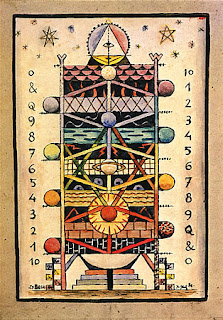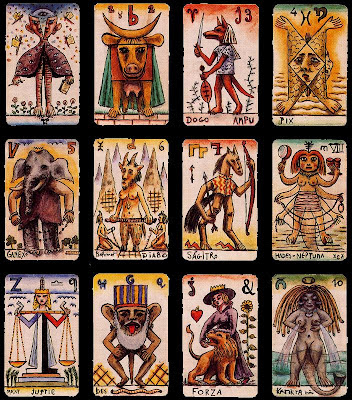Rotulo by Xul Solar.
Complete the text with past simple about Xul Solar:
As a painter, Xul Solar_________( work) with watercolor, tempera and oils. He_________(develop) mainly a self-taught talent with a visual palette that ________(be) a very distinct way of looking at life. He _________(create) his own style in art mixing philosophy, astrology and different religions through bright colors and geometric forms.
In 1912, Xul (travel) _______to Europe. There, he _______(study) the style of Modigliani, Picasso, Kandinsky and Paul Klee which__________(influence) his artistic work. 1n 1917, he ______(meet) the Argentine artist, Emilio Pettoruti in Firenze, Italy. Emilio __________(introduce) Xul to Futurism, a style that he________(use) many times in his art. Xul and Emilio ________(build) a friendship and artistic partnership and ________(tour) together several European countries. In 1920, Xul _______(make) his first major exhibition in Milan, together with the sculptor Arturo Martini with great success.
After his return to Argentina from
Europe in 1924, Xul ______(begin) a long lasting friendship
with Jorge Luis Borges. They ______(share) numerous topics of interest and
intellectual affinities like oriental philosophy, literature, religion,
mysticism, art and the passion for language. In 1928, Xul
_______(illustrate) the cover of "The language of the Argentines" by Jorge Luis Borges with oil and its interior with watercolors.
Xul_________(become) an active member of the group ‘Martin Fierro ’
which ______(include) artists like Emilio Pettoruti ,Oliverio Girondo,
Leopoldo Marechal, Pedro Figari and Nora Lange.
Xul Solar _______(be) one of the most talented
argentine artists and_______(have) a huge impact on the art world. He
_________(get ) influences for his paintings from different art movements like
Futurism, Surrealism and Expressionism and also from his travels and the
individuals he _________(encounter) on his journeys.
Texto cívico by Xul Solar.
Answers:
Xul Solar was a talented
Argentine painter, sculptor, writer, musician and inventor. He was
born in San Fernando, Argentina in 1887 from Italian mother and German father.His
real name was Oscar Schulz Solari. He took his surnames and invented his artistic name
Xul Solar.
As a painter, Xul Solar worked with watercolor, tempera and oils. He developed mainly a self -taught talent with a visual palette that was a very distinct way of looking at life .He created his own style in art mixing philosophy, astrology and different religions through bright colors and geometric forms.
Drago by Xul Solar.
In 1912, Xul traveled to
Europe . There, he studied the style of Modigliani, Picasso,
Kandinsky and Paul Klee which influenced his artistic work. 1n
1917, he met the Argentine artist,
Emilio Pettoruti in Firenze, Italy. Emilio introduced Xul to Futurism, a style that he used many times in his art. Xul and Emilio built a
friendship and artistic partnership and
toured together several European countries. In 1920, Xul made his first major exhibition in Milan,
together with the sculptor Arturo Martini with great success.
After his return to
Argentina from Europe in 1924, Xul began a long
lasting friendship with Jorge Luis Borges. They shared numerous topics
of interest and intellectual affinities like oriental philosophy, literature,
religion, mysticism, art and the passion for language. In 1928, Xul illustrated
the cover of "The language of the Argentines " by Jorge Luis
Borges with oil and its interior with watercolors.
Xul became an active member of
the group ‘Martin Fierro ’ which included artists like Emilio Pettoruti, Oliverio Girondo, Leopoldo Marechal, Pedro Figari and Nora Lange.
Xul Solar was one of the most talented argentine artists and had a huge impact on the art world. He got influences for his paintings from different art movements like Futurism, Surrealism and Expressionism and also from his travels and the individuals he encountered on his journeys.
In addition to all the pictorial works this great twentieth-century Argentine avant-garde left, Xul Solar also ventured into the field of invention, always with the intention of recreating and, above all, improving reality. Some of his original creations were the board game Panjuego and the languages Panlengua and Neocriollo. Also, he reinterpreted the tarot cards painting them with Neocriollo names.
The Panjuego, the board game where everybody wins!
The Panjuego, etymologically ______(mean) the total game so that it is a game that ________( contain) everything in itself
The panjuego _______(use) a board with different colored and engraved chess pieces. In this game the objective_______(be) is not the death of the enemy but the creation: by means of the movements of the pieces, you can create musical and poetic compositions or solve mathematical problems.
The pieces are marked with consonants (minus the pawns that are numbers) and the squares of the board with vowels. In this way, each movement of the board_______( produce) different words.
Each piece of the game in turn ________(represent) a planet, thus, each position _______(refer) to possible ephemeris or avatars in history.
The panjuego chess by Xul _______(have) 13 x 13 squares (and not 8 x 8 like the conventional one) that _______(represent) the stars and constellations. Instead of 16 pieces, each player ______(have) 30, one of which they can use both interchangeably.
The game _______(begin) with the empty board and the pieces are not eaten, but are caught and become their own.
But what we like most about him is that no one______( lose) and everyone_____(win):
definitely the game we all want to play!
FREE ONLINE COURSES FROM TOP UNIVERSITIES
https://miriadax.net/cursos
https://www.futurelearn.com/
* Para acceder tenés que registrarte y el material de los cursos es gratuito pero si querés certificado tenés que abonarlo y enviar los tests hechos .
* To get access you have to sign in and the material of the courses is free but if you want the certificate you have to pay for it and send the tests done .
Answers
The Panjuego, the board game where everybody wins!
The Panjuego, etymologically means the total game so that it is a game
that contains everything in itself.
The Panajuego uses a board with different colored and engraved chess pieces. In this game the objective is not the death of the enemy but the creation: by means of the movements of the pieces, you can create musical and poetic compositions or solve mathematical problems.
The
pieces are marked with consonants (minus the pawns that are numbers) and the
squares of the board with vowels. In this way, each movement of the board
produces different words.
Each
piece of the game in turn represents a planet, thus, each position refers to
possible ephemeris or avatars in history.
The Panjuego chess by Xul has 13 x 13 squares (and not 8 x 8 like the conventional one) that represent the stars and constellations. Instead of 16 pieces, each player has 30, one of which they can use both interchangeably.
The game begins with the empty board and the pieces are not eaten, but are caught and become their own.
But what we like most about him is that no one loses and everyone wins:
definitely the game we all want to play!














No hay comentarios:
Publicar un comentario